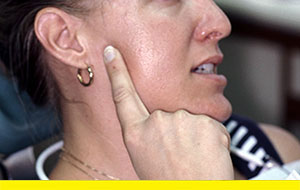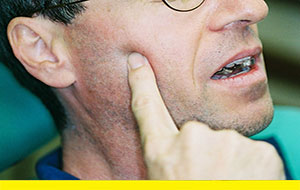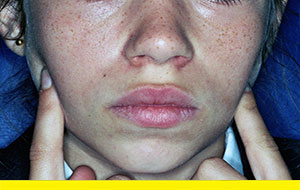Symptoms and Common Causes of TMJ Disorder
Whilst the actual cause of a TMJ disorder is often unknown, there are many contributing factors that can lead to or aggravate a TMJ disorder. Because some other conditions can cause similar symptoms of the TMJ, it is important for Your Dental Specialist to diagnose the source of the jaw pain first.
Identifying the cause of the temporomandibular joint disorder (TMD)
Eating or talking can no longer be taken for granted so if you are having trouble eating or opening your mouth due to jaw pain, or experience jaw pain on waking, give us a call and make an appointment so you can be assessed.
Causes of TMJ may consist of:
- Missing teeth
- Clenching or grinding teeth at night and in most occasions is linked to stress
- Physical stress creating tension in the jaw muscles
- Dislocations of the TMJ through injuries
- Incorrectly fitted or shaped dental fillings, crowns or bridges
The major TMJ disorder symptoms are:
- Joint noises (clicking, popping, crunching and crepitus which feels like grating) of the deranged / displaced disc
- TMJ pain
- Locking of the jaw
- Restricted opening and movement and facial pain.
Other collateral symptoms include:
- Ear and eye pain
- Watery eye – usually only in one eye
- Facial tension
- Headaches or migraines
- Chewing pain
- Head and neck muscular pain
Other unusual symptoms that have disappeared after occlusal therapy include:
- Vertigo or dizziness
- Tinnitus – Ringing in the ears
- Loss of hearing
- Sinus symptoms
- Sleep apnoea (Total resolution following sleep study verification)
- Shoulder pain
These ongoing nasty symptoms in Dr. Florian Mack’s experience as a Prosthodontist can often lead to:
- Poor concentration
- Broken sleep
- Short term memory loss
- Depression
This video below explains TMJ disorder as simply as possible to help you understand
and recognise the symptoms and best treatment options.
You could have one or many of the symptoms but you need to be given the right advice and dental care to alleviate the pain and prevent your condition from getting worse.
Best described by patients themselves:
We have compiled a list of comments that people typically say they have experienced when they come to us:
- I just woke up and my jaw was locked and can’t open my mouth
- I have pain in my ear and feels like someone poking a pen or screwdriver into my ear
- I feel as though I can’t hold my face up any longer
- I have had clicking in the jaw for years
- I have suffered migraines and headaches for more than 30 years
- I am extremely tired and exhausted from my facial muscles holding up my face
- I want to go out and have dinner with friends and family and not eat like a horse
- My teeth don’t feel as though they fit together properly
- My jaw dislocates when I eat
- I grind my teeth at night
- I clench my jaw in my sleep
- My face is swollen on one side
- My jaw is tender to touch
- I can’t bite an apple or eat steak
- I just went deaf all of a sudden without any cold virus or symptoms of ear infection
- I have pain in my shoulder and back of neck
Does that sound like you? How many boxes could you tick?
You could have one or many of the symptoms but you need to be given the right advice and dental care to alleviate the pain and prevent your condition from getting worse.
Where to from here?
The symptoms described above are all largely to do with the ‘occlusion’ bite, a dental subject involving the bite.



